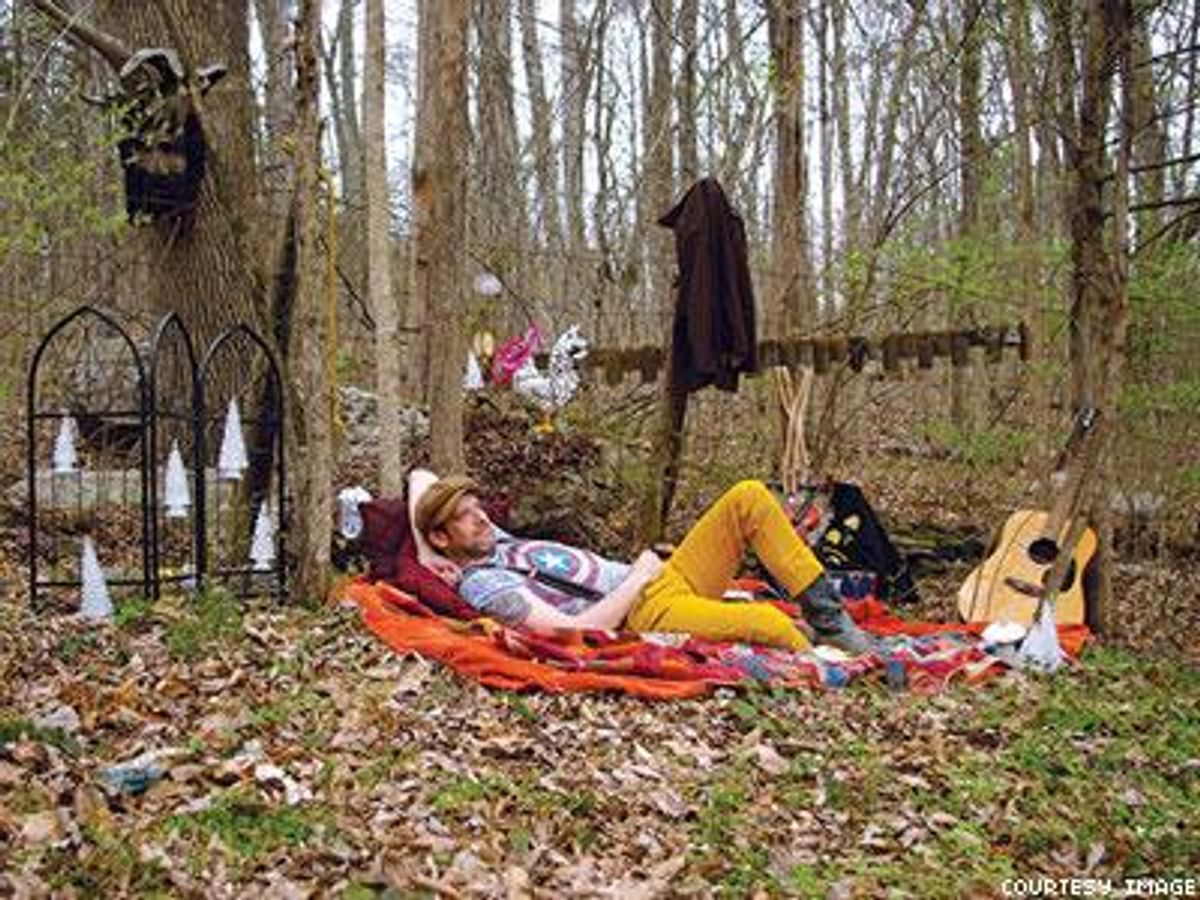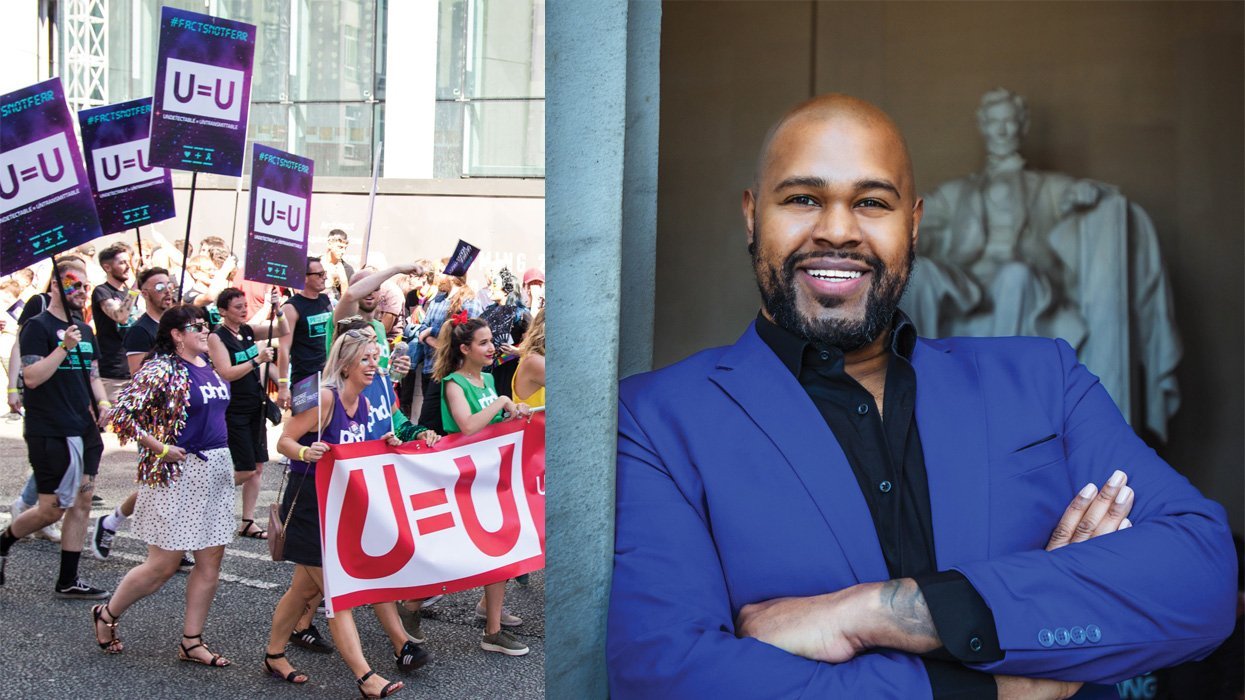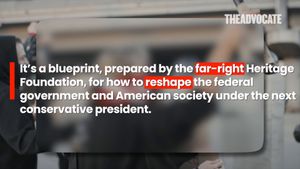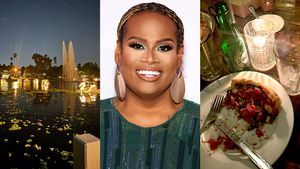
For nearly a decade, Byron Keith was a star in the contemporary Christian music scene — during the industry’s heyday in Nashville — with tens of thousands of fans in the U.S. and abroad. He toured the world, released eight albums, got married, had children, and then came a public divorce and outing as a gay man. He disappeared in 2005, but to the excitement of his die-hard fans, he reappeared in 2012 with new music — this time in the Americana folk fusion genre — and a new moniker, Byron Rice. We chat with Rice about his life, his new album (out early this year), and being a poz performer.
Tell me about going on hiatus.
My wife and I had been working through the process of [divorce] and my obligations as a Christian country artist. Unfortunately, my accountability pastor decided to spread the word, and so it was a hard last year between us. So, between being told I wasn’t a man of God anymore, and that I wasn’t welcome at a lot of churches because I’d gotten divorced — they didn’t even know I was also dealing with the fact that I was gay, and we were trying to deal with that issue as well — it was definitely a hard time. I just basically didn’t have anything relevant to say anymore, because I’d been beaten down by so many people.
That must have been tough for your wife as well.
Yeah. We spent two years really going through the process of making sure that was what we wanted. We have two daughters, so we wanted to make sure that they were of the appropriate age too, for us to separate — so that they could understand what was going on. She and I are good friends, so that helps the process a lot.
You acted while on hiatus, but, ironically, when you did the musical Rent, which is about HIV and AIDS, a costar found out you were HIV-positive and had some objections to touching you.
Correct. That kind of put me back in a spiral. I felt basically, right back in the same place I was when I left the Christian music industry. I felt I didn’t have a place to fit now in the acting community. Through that, I kind of started to write a lot more. And then I met my best friend, good friend, Kevin Garrett, who also is my manager. He had a studio and wanted to start putting an album together. I had already written a few songs, so we started putting some songs together and it wound up becoming an album.
You’ve been working through Kevin’s label and now you’re signing with a major label, Warner Nashville, to re-release Lost in the Woods. Does the title allude to how you felt?
For me, Lost in the Woods is about [when] I had to go and find my space, my spiritual space, and my own personal space. My friend had invited me out to an event in the woods here in Tennessee with a group of very loving hippies. And through that experience and sharing music and all of that, it was the beginning steps of me starting to come back to realizing that I had a lot more to say. That I was relevant and that I did have something that was about my life experience that would help other people.
 “Lie Here Tonight” is a beautiful song, a great coming-out narrative that can apply to so many people in different situations.
“Lie Here Tonight” is a beautiful song, a great coming-out narrative that can apply to so many people in different situations.
It kind of has a little autobiographical arc to it. It was written the way that my ex and I communicated through some of our dealings with finally coming to the realization that I was gay. I would get in the car and drive, and we would have conversations over the phone so that she didn’t have to see my face as she was having these conversations, just so that it wasn’t uncomfortable for us.
Did your parents’ divorce impact how long you stayed in your own marriage?
Yeah. My parents, both my parents, grew up very strict Christians. When my parents got divorced — the reason the song is written the way it is — when my parents got divorced, my mother left for another woman. It definitely shook our family quite a bit. The process of my ex-wife and I dealing with it all — it was kind of like watching my parents’ divorce relive itself out.
Were you thinking, I’m going to do this differently?
Definitely. [My ex-wife] Melissa and I had gone through a lot growing up. I had been molested for three years when I was younger, and there was another guy who molested me when I was 12. I had a lot of secrets and things that I kind of kept hidden because I grew up in such a strict home. I’d seen how people reacted to the “gay lifestyle,” and it was definitely hard for me to finally come to the place of being able to say it to my ex-wife. We wanted to work through it together because we had been working through it together all of our relationship.
When did you decide to be open about being HIV-positive?
[The incident with] Rent really outed me. When I found out [I was poz] I kind of went into a depression. Finally coming out and realizing I had a lot more to say and a lot more to do, I was just trying to find a voice that I could still feel like I was making a difference. The only reason that I allowed the Rent thing to become so public is I didn’t want to have something I felt I regretted and didn’t stand up for my daughters. So, at that time, I had to tell my daughters that I was HIV-positive. There were a lot of choices I had to make before that even came out, for myself and for my family, because I knew that it would be a very public thing. Something that would be a public thing for a long time — because, I mean, you type my name into Google and you type “Byron Rice HIV” or “Byron Rice and gay” and they pop up. It’s not like it’s going to go away anytime soon. I had [to decide] whether I was ready for that. It was hard when I first came out about it all, because I didn’t know how people reacted, because I kind of sheltered myself.
And you said your “writing family” kind of surrounded you?
Yes, because Nashville isn’t really known for the “put your arm around the gay guy” kind of situation. It was very public, and I was still going out singing. The great thing is that through all that, a lot of people got to experience somebody that’s just dealing with [being HIV-positive and gay].
Some of your songs have little shades of Johnny Cash, the storyteller. Tell me a little bit about the song “Yesterday, Today, Forever.” It’s a great song.
Wow, you went to the best stuff. I haven’t talked about that song in forever. It’s my mom’s favorite song. It was during a time where I think that I was realizing — I mean, my faith is my faith and that’s how I’ve always kind of viewed it. I don’t try and put my faith on other people. I don’t try and take away from what other people are going through, because you don’t know where other people are at in their walk. You don’t know where they’re at in their journey, and you don’t have a guideline to say, “This is the best way to do it.” It’s easy to forget that God is always there, and through all of this stuff that I went through, it was very easy for me to not see God in it. I saw a lot of anger, and I saw a lot of things that people wanted to condemn me for without looking at where I had come from or where my walk had gone, because they didn’t see all the stuff that led up to where I was. They only saw from that point, and they were judging me from that point.
And that’s what that song is about. Saying sometimes I forget that God is there, and I need to remind myself that he said he’s there every moment of the day, and he’s going to be there every moment of the day. He’s there through all of the pains I go through with HIV, and he’s there for all of the rejoicing I get to have when it’s undetectable, when my T cells are high, and I am excited. I mean, I try to remember him in all of those things.
What have you learned about HIV that you’d want others to know?
I think one of the biggest things is to just remember that HIV isn’t a sin. I think a lot of churches still view it that way. It’s because of something you do but that it doesn’t define who you are. It isn’t defining who I am, and that is why I’m openly talking about it versus trying to be private about it, because for me, I need to let people know that I’m living with it, yes, but it is still something that isn’t going to control me or determine who I am.
WATCH: Byron, with his daughters, singing Colbie Caillat's "Try"


 “Lie Here Tonight” is a beautiful song, a great coming-out narrative that can apply to so many people in different situations.
“Lie Here Tonight” is a beautiful song, a great coming-out narrative that can apply to so many people in different situations.















































































